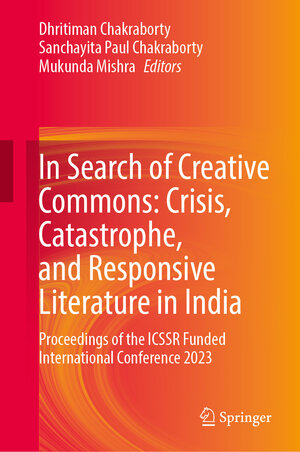
In Search of Creative Commons: Crisis, Catastrophe, and Responsive Literature in India
Proceedings of the ICSSR Funded International Conference 2023
herausgegeben von Dhritiman Chakraborty, Sanchayita Paul Chakraborty und Mukunda MishraThis book contains selected papers presented at the international conference titled 'In Search of Creative Commons: Crisis, Catastrophe, and Responsive Literature in India', held at the Abid Ali Khan Centre for Digital Archive and Translation of Cultures, Gour Mahavidyalaya (College) from 31 August to 2 September, 2023 in collaboration with the Department of English, Dr. Meghnad Saha College. The conference was funded by the Indian Council of Social Science Research (ICSSR).
In this book, three basic questions are considered. First, as humans try to live in-and-through catastrophes and exceptional situations in the contemporary world, what new perspective can literature as a creative form offer for healing and restorative purposes? Second, what new idioms and narrative styles, massive crises such as famine, partition, migration, the decimation of forests, rivers, and the disappearance of villages held up in creative articulations in colonial and postcolonial times in India? Can these representations be called “responsive literature”? Further, and this is the third major contention of this book, how can responsive literature be thought of as a conceptual category? What new transdisciplinary optic should be adopted to go beyond the limits of the “literary” and eventually include the “non-literary”?
The objective of these discussions was to contribute to the larger discursive literature on disaster studies, which we believe has been excessively hegemonized by concepts from the West. By bringing in indigenous ideas from Bhasa Sahitya (language and literature), the images of samaj (society), samata (equity), and ahimsa (non-violence), the existing literature on catastrophe and crisis studies can finally be decolonized.



